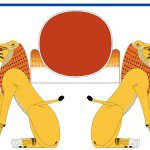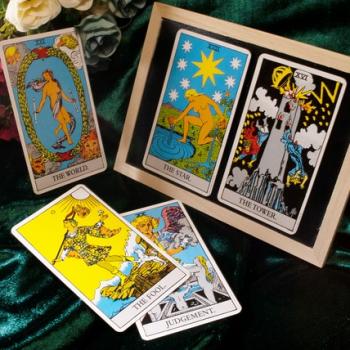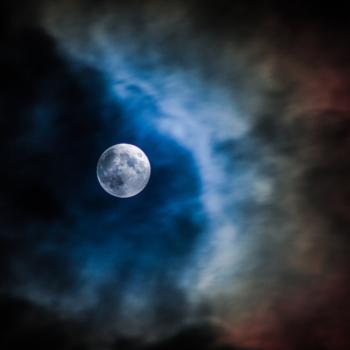I regret that the title of this post will be upsetting to some, but this statement is not meant to belittle or demean any religion in particular or all religions in general. I’m a religious person myself and one who believes in the reality of the divine, but I’m also a scientist. Much of what I write about here stems from my own doubts and a struggle to reconcile these two aspects of my life. This is, in its essence, a story about how I worked through doubt for myself.
The conversations about whether and how we include fiction in our religious and spiritual practices have been really interesting these past few weeks, and I’m pretty sure I haven’t got around to all the wonderful responses around the blogosphere. I hear tell that there’s some lively conversation on Tumblr, but I don’t Tumbl, so I’ve largely missed out on that. This post is especially good and explores the diversity of Pagan belief within the context of the discussion we’ve been having. Reading about the various opinions on pop culture and Paganisms has been especially interesting when the conversation is courteous and respectful, and I’ve done my best to be both courteous and respectful in my posts and responses as well. There are a lot of folks out there who don’t believe as I do and that’s okay. My own beliefs are either strong enough to withstand challenges to them, or flexible enough to change when new information is presented. It is good and healthy to have one’s beliefs challenged, since it provides opportunity to apply some critical thinking and to develop stronger and more nuanced beliefs.
I’ve long been of the opinion that there is no person in the world who can tell me what I believe except for me. It’s my responsibility to take the information I have, form ideas based on that information, and either support, alter, or abandon those ideas when new information is presented. Religion is not a field of study where measurable evidence is very useful. Faith and belief have more to do with experience than anything else and experience of the divine, or lack of it, is a highly subjective and individual thing. The sciences are different, of course, and require measurable evidence to answer questions. We can study archaeology and anthropology and cobble together an idea about how people practiced ancient religions. We can even figure out what they may or may not have believed. What we can’t do is verify any religious belief as true or untrue.
The atheist’s argument is that you can’t prove a god exists, and the believer’s argument is that you can’t prove a god doesn’t exist. Both are correct. The nature of the gods is such that they don’t leave measurable, tangible evidence, but rather that we know them through our experiences. Part of this discussion on “pop culture Paganism” has been about the nature of the divine: what “counts” as a divinity and what does not. In the absence of measurable evidence, I must assume that an individual’s experience of the divine is real. For my own part, I do let my inner skeptic ask the “am I making this up?” question to keep me from talking the crazy talk. Sometimes the answer is yes, but I wouldn’t be a believer if the answer was always yes.
I’ve never been the leading priestess of a ritual where the spirit or thought form of a superhero was invoked. Of course, I’ve never done a ritual that called upon the ancient heroes, either. My own focus of worship is with the Theoi and that’s more than enough to be going on with. (Have you seen the Athenian calendar?) I did, however, participate in a ritual for someone else that involved characters from Alice in Wonderland and for the purpose of that ritual, I was asked to be the White Rabbit. Whether that was a thoughtform, a new divinity, an expression of an archetype, an old divinity in disguise, or something else, I honestly don’t know. What I do know is that the manifestation was as real as it gets in religion, but I have no evidence that the White Rabbit was present except for my experience.
We call this sort of experience Unverifiable Personal Gnosis (UPG), often with some disdain. A UPG isn’t considered as “real” as other aspects of religion and is looked down upon. But we can’t really prove any of this stuff. Some will cite the antiquity of a concept of the divine as “evidence” of it’s legitimacy, but an old UPG is still a UPG. How do we know Apollo sees afar? What evidence do we have that Athena has grey eyes? Somewhere in history, somebody had a UPG and others either had a similar experience or thought the original experience seemed legit. In the absence of tangible, measurable evidence that my atheist scientist colleagues wouldn’t laugh at me for presenting, I cannot say that any experience of the divine or other non-corporeal subdivine entity isn’t real, even when it’s Batman. I’ve never experienced Batman in this way, but others have. I can’t say those experiences aren’t real, only that this has not been my experience.
The same goes with any religion that is not my own. I have never experienced Jesus Christ as my Lord and savior, but others have and it brings them fulfillment. Seems legit. Same goes with Hinduism, Islam. Baha’i, and a whole list of other religions that come with experiences of the divine that I haven’t had. The divine is a pretty big thing and to say that I know all that is contained within it is pure-D-hubris. Our perception of the divine is necessarily limited by our finite monkey brains. We can’t handle the divine in its fullness; just ask Semele how that went. And when statements like “my religion is real and yours is not” or “my gods are real and yours are made-up,” we’re saying that we Know what the divine is. This is a dualistic worldview that I do not adhere to in the lack of evidence supporting proof that any single objective reality exists. I’m not saying that all religions are make-believe; I’m no atheist. I’m saying that the divine is big enough to contain all concepts and that no one person has the one true way to the Truth. We can’t know the entirety of what the divine is. It’s impossible. Our brains would explode.
That brings me back around to my earlier statement that no one can tell me what to believe but me. Likewise, I can’t tell anyone else what to believe or what’s True about the divine. I have found this attitude to be foundational to interfaith work. In this way, I’m able to simultaneously hold firm to my own beliefs while accepting that others can find Truth and fulfillment in their beliefs. My rightness does not hinge upon my neighbor’s wrongness. I’m pretty sure that not everyone does interfaith this way, but it works for me.
Making Light is an occasional column by Hellenic polytheist Sunweaver. Follow it via RSS or e-mail!

















